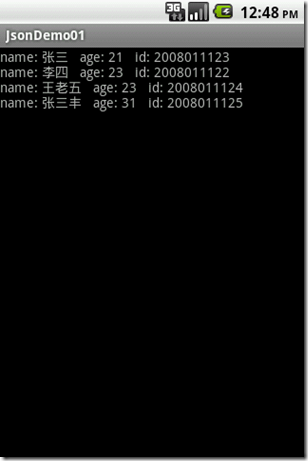最近做一项目,有很多地方得用到网络数据传输与解析,这里采用的是Json方式,它与传统的XML解析方式比起来,有自己的一些优点,首先,它是比XML更轻量级,再一个,写一个XML文件是个烦人的事儿,而Json则相对轻松些。
Android平台有Jsong相关的类来进行Json数据解析,悲剧的是,它们是Android SDK3.0以后才能用的。不过在谷歌网站: http://code.google.com/p/google-gson/里有一个名为Gson的类库,可以用它来解析Json数据,并且,Adroid 3.0平台里其实也就是把这一部分直接整合进Android里了。我们要解析Json数据,直接去网站上下载个jar包,导入到工程里,就可以解析Json数据了。
下面有个例子,很清晰的解释了这种工作方式:
先看看两个我自己封装的类:
HttpUtils.java:
public class HttpUtils { //从服务器端下载到Json数据,也就是个字符串public static String getData(String url) throws Exception {StringBuilder sb = new StringBuilder();HttpClient httpClient = new DefaultHttpClient();HttpGet httpGet = new HttpGet(url);HttpResponse httpResponse = httpClient.execute(httpGet);HttpEntity httpEntity = httpResponse.getEntity();if (httpEntity != null) {InputStream instream = httpEntity.getContent();BufferedReader reader = new BufferedReader(new InputStreamReader(instream));String line = null;while ((line = reader.readLine()) != null) {sb.append(line);}return sb.toString();}return null;}JsonUtils.java:public class JsonUtils {public static List<Student> parseStudentFromJson(String data) {Type listType = new TypeToken<LinkedList<Student>>() {}.getType();Gson gson = new Gson();LinkedList<Student> list = gson.fromJson(data, listType);return list;}}里面的Student是一个JavaBean对象:
public class Student {private String name;private int age;private String id;public Student() {super();}public Student(String name, int age, String id) {super();this.name = name;this.age = age;this.id = id;}public String getName() {return name;}public void setName(String name) {this.name = name;}public int getAge() {return age;}public void setAge(int age) {this.age = age;}public String getId() {return id;}public void setId(String id) {this.id = id;}}再看看我们要解析网络数据的Activity:
public class MainActivity extends Activity {private TextView textView;private List<Student> list;/** Called when the activity is first created. */@Overridepublic void onCreate(Bundle savedInstanceState) {super.onCreate(savedInstanceState);setContentView(R.layout.main);textView = (TextView) findViewById(R.id.textView);String data = null;try {data = HttpUtils.getData("http://10.16.12.165:8080/JsonTest/JsonTestServlet");} catch (Exception e) {e.printStackTrace();}String result = "";list = JsonUtils.parseStudentFromJson(data);for (Student s : list) {result += "name: " + s.getName() + " " + "age: " + s.getAge()+ " " + "id: " + s.getId() + "\n";}textView.setText(result);}}这样就可以获取网络数据并加以解析利用了,运行结果如下:
另外,还有一篇不错的文章: http://curran.blog.51cto.com/blog/2788306/514605
